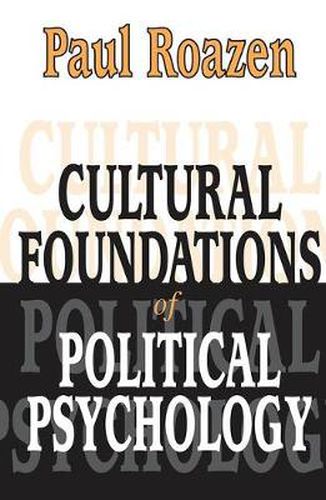Readings Newsletter
Become a Readings Member to make your shopping experience even easier.
Sign in or sign up for free!
You’re not far away from qualifying for FREE standard shipping within Australia
You’ve qualified for FREE standard shipping within Australia
The cart is loading…






Over the centuries all of the great philosophers made psychology central to understanding social life. Indeed, the ancient Greeks thought it impossible to conceive of political life without insight into the human soul. Yet insufficient professional legitimization attaches to the central importance of modern depth psychology in understanding politics. Cultural Foundations of Political Psychology explores the linkages between psychology and politics, focusing on how rival conceptions of the good life and unspoken moral purposes in the social sciences have led to sectarian intolerance. Roazen has always approached the history of psychoanalysis with the conviction that ethical issues are implicit in every clinical encounter. Thus, his opening chapter on Erich Fromm’s exclusion from the International Psychoanalytic Association touches on a host of political matters, including collaboration as opposed to resistance to Nazi tyranny. Roazen also brings a public/private perspective to such well-known episodes as the Hiss/Chambers case, the circumstances of Virginia Woolf’s madness and suicide, and the matter of CIA funding of the monthly Encounter. He deals with the reaction to psychoanalysis on the part of three major philosophers - Althusser, Wittgenstein, and Buber - and looks at the link between psychology and politics in the work of such political theorists as Machiavelli, Rousseau, Burke, Tocqueville, Berlin, and Arendt. A chapter grappling with Vietnam and the Cold War illustrates how political psychology should be concerned with questions of an ethical or ought character. In examining the social and psychological bases for political theorizing, Roazen shows how both psychology and politics must change and redefine their methodologies as a result of their interaction. Roazen concludes with a chapter on how political psychology must deal with issues posed by changing conceptions of femininity. This volume will be of interest to those interested in the intersection of psychology and politics.
$9.00 standard shipping within Australia
FREE standard shipping within Australia for orders over $100.00
Express & International shipping calculated at checkout
Over the centuries all of the great philosophers made psychology central to understanding social life. Indeed, the ancient Greeks thought it impossible to conceive of political life without insight into the human soul. Yet insufficient professional legitimization attaches to the central importance of modern depth psychology in understanding politics. Cultural Foundations of Political Psychology explores the linkages between psychology and politics, focusing on how rival conceptions of the good life and unspoken moral purposes in the social sciences have led to sectarian intolerance. Roazen has always approached the history of psychoanalysis with the conviction that ethical issues are implicit in every clinical encounter. Thus, his opening chapter on Erich Fromm’s exclusion from the International Psychoanalytic Association touches on a host of political matters, including collaboration as opposed to resistance to Nazi tyranny. Roazen also brings a public/private perspective to such well-known episodes as the Hiss/Chambers case, the circumstances of Virginia Woolf’s madness and suicide, and the matter of CIA funding of the monthly Encounter. He deals with the reaction to psychoanalysis on the part of three major philosophers - Althusser, Wittgenstein, and Buber - and looks at the link between psychology and politics in the work of such political theorists as Machiavelli, Rousseau, Burke, Tocqueville, Berlin, and Arendt. A chapter grappling with Vietnam and the Cold War illustrates how political psychology should be concerned with questions of an ethical or ought character. In examining the social and psychological bases for political theorizing, Roazen shows how both psychology and politics must change and redefine their methodologies as a result of their interaction. Roazen concludes with a chapter on how political psychology must deal with issues posed by changing conceptions of femininity. This volume will be of interest to those interested in the intersection of psychology and politics.